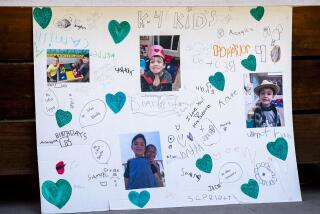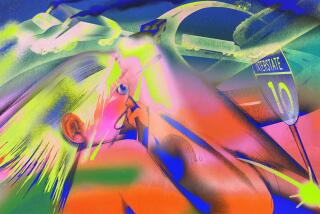Bible’s ‘Love the Sojourner’ Applies on I-5
- Share via
It is rush hour, and I’ve just changed lanes but misjudged the speed of a pickup truck behind me. Suddenly he’s on top of me, beeping and giving me the high-beam treatment. I feel the anger rising and am tempted momentarily to use an obscene gesture. Fortunately, a combination of fear and wisdom tells me to stay cool. Nothing got hurt except my pride.
I suspect that my experience resonates with many readers. More and more frequently, however, incidents like that one end in disaster. An offended motorist makes an obscene gesture to another driver, who then begins tailgating or beeping. The two may pull off the road and begin fighting, or an accident may leave one or both of them dead or seriously injured.
Each year, according to the National Highway Traffic Safety Administration, a third of the approximately 6.5 million injury collisions and two-thirds of the 36,000 fatal crashes result from aggressive driving or out-and-out road rage. With the summer driving season in full throttle, the problem becomes perhaps even more acute.
In response, Professor Sheila Sarkar of San Diego State University, founding director of the California Institute of Transportation Safety, or CITS, has developed the “Cool Operator Program.” It seeks to raise awareness of aggressive driving and road rage through anger-management seminars, media campaigns and community support.
With funding provided by the California Office of Public Safety, the seminars are offered free to public institutions and agencies and to private companies. It is a commendable program, with more than 90% of participants thus far indicating that the seminar was very or somewhat useful in curbing their aggressive road behavior.
CITS works closely with the Network of Employees for Traffic Safety, or NETS, a public-private partnership based in Washington. NETS makes the following suggestions:
Be courteous and tolerant while driving, avoid rushing by allowing ample time for your trip, play soothing music, lead by example, don’t make driving a competitive exercise and relax for a few moments before beginning your commute.
In addition, the world’s religious traditions contain insights that can be very helpful in turning highway anger into highway compassion. Paramount among these is some version of the Golden Rule--to love your neighbor as yourself or, expressed negatively, to refrain from doing to another what is hateful to you. And the Buddhist meditation on loving kindness puts it this way: “May all beings be well and happy.”
Of course, it all sounds noble in theory, but how does one turn contemplation into action? A few suggestions follow.
Try to view driving as an opportunity to perform “random acts of kindness.” People sometimes lament that they would like to do volunteer work--give something back--but lack the time. Most of us spend at least an hour a day driving, so why not use it to make life just a bit easier for other human beings?
Example: Someone is driving rather slowly and appears to be lost. Although it may not be possible for you to stop and offer assistance, at least don’t beep or roar past or flash a dirty look. Stay cool, smile and go around the slow car. The lost driver may be aware of what you’ve done and appreciate the consideration. It not, at least you’ve done yourself a favor by not elevating your blood pressure.
The ethical teaching of most religions counsels a respectful and welcoming attitude toward the stranger: “Love the sojourner therefore; for you were once sojourners in the land of Egypt,” counsels the Book of Deuteronomy. On the freeways of California we encounter thousands of strangers and, unlike the shopping mall where most people are reasonably civil, the automobile makes a high degree of anonymity possible.
Such anonymity breeds a depersonalizing of other drivers and a consequent rudeness and competitiveness. However, as Stephen Carter has observed in his fine 1998 book, “Civility (Manners, Morals and the Etiquette of Society),” in a large democracy most of us are strangers to each other. Consequently, to make such a democracy work, we need to sacrifice for the stranger and not just for the people we know. Letting people into your lane, slowing down, and refraining from rude gestures can make our roadways more democratic and more tolerable.
The term “compassion” is derived from the Latin for feeling or suffering with another. When someone makes a driving error--changing lanes without looking, slowing down after missing an exit, not immediately noticing the light has turned green, even cutting you off--recall that at least once in your life you’ve probably made the same mistake.
Driving is an inherently frustrating and dangerous activity. When we act with a greater awareness of the need for kindness and compassion, our drive time can become safer and more civil.






